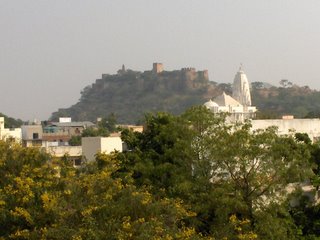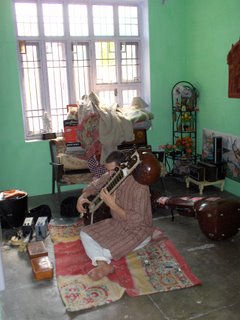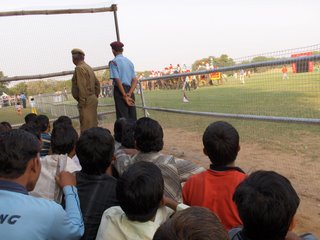And So It Goes
Here in Pune, a couple of hours south of Mumbai/Bombay, we're counting down the hours of the last day in 2006 of the Gregorian calendar. We're gonna do it up big time--play a few good games of Spit, drink some rum and coke on the porch of our little hotel room under the jacaranda and coconut trees, revel in the quietness of our little nook (a welcome relief after a couple of weeks in Kolkata next to a hotel of particularly ill-behaved foreigners who hosted drunken parties with brutally off-key singing until 4 in the morning).
We're almost at the end of our second month in India, and we're still amazed and confounded on a daily basis, although we're not as scared to cross the street as we were in the beginning. Some of the words we've heard to describe this country are (from Indians and foreigners): unfathomable, fascinating, surprising, maddening, frustrating, enchanting. And perhaps the best phrase we've heard so far: "In India, everything is possible" (courtesy of a young man we met on the 33 hour train ride from Kolkata to Mumbai). What in particular is possible and probable and, in fact, happening here?
--Tranvesites (maybe eunuchs, I'm not sure) asking for money and giving blessings in return with slightly flirtatious smiles
--Enormous Christmas day crowds on Park Street that paused in awe and wonder in front of mechanical peacocks making very very VERY slow bows.
--The fact that Josh and I actually wierdly enjoyed being in the middle of that Christmas day mass of humanity--a crowd that two months ago would have made us claustrophobic beyond imagining.
--Car horns that play minor triads and show tunes.
--An Indian man in shorts (a very strange sight actually) who asked us if Americans cooked with oil.
--Evangelical Hindus.
--A trip to the post office turning into an hour long venture--you walk inside and everyone looks at you like you must be lost. Finally someone waves you to a particular window where a man weighs the letters and tells you how much postage you need. You then go to another window and a woman gives you stamps, but they don't actually stick to the letter. The post office doesn't actually have any tape or glue, so you cross the street to the bookstore where you smear industrial strength glue all over the letter. You then go back to the post office, double check the postage and drop the letter in a box. Everyone later assures you that this is an infinitely better system than 10 or 15 years ago when one of Josh's teachers found letters he'd sent on top of a huge pile of mail dumped on the side of the street.
--A young Indian woman on the train who belted out Celine Dion's song from the Titantic with an astounding voice and perfect English pronunciation. She then asked me to sing her some Michael Jackson songs. I settled for a rousing rendition of Rudoph the Red-Nosed Reindeer.
--"Lady In Red" playing while I write this.
Our Hindi is coming along, although we got a bit sidetracked by Bengali when we were in Kolkata. I'm still trapped in the present tense and the occasional gerund if I'm lucky, but I do know how to say "Go away!!" very forcefully which came in handy on the street the other day with a man who decided to share a body part with me that I really didn't want to see--unfortunately an experience that I've had in the States and Guatemala as well. But that was quickly negated by the very kind young men working at our hotel who helped me practice my Hindi with sentences like "My husband plays the sitar," "I am a poet," "Please turn on the meter," "This place is very beautiful." When in doubt we say "Achaa."
Josh and I are escaping the urban experience for a couple of days--heading to a hill station that has banned autos and plastic bags. Our kind of place. We'll then return to Pune for a few more days until Josh's brand new sitar is all spiffed up and ready to join our happy little family.
May the New Year (as arbitrary as it is) bring you as much joy, peace and love as you have all blessed us with.
J&J
We're almost at the end of our second month in India, and we're still amazed and confounded on a daily basis, although we're not as scared to cross the street as we were in the beginning. Some of the words we've heard to describe this country are (from Indians and foreigners): unfathomable, fascinating, surprising, maddening, frustrating, enchanting. And perhaps the best phrase we've heard so far: "In India, everything is possible" (courtesy of a young man we met on the 33 hour train ride from Kolkata to Mumbai). What in particular is possible and probable and, in fact, happening here?
--Tranvesites (maybe eunuchs, I'm not sure) asking for money and giving blessings in return with slightly flirtatious smiles
--Enormous Christmas day crowds on Park Street that paused in awe and wonder in front of mechanical peacocks making very very VERY slow bows.
--The fact that Josh and I actually wierdly enjoyed being in the middle of that Christmas day mass of humanity--a crowd that two months ago would have made us claustrophobic beyond imagining.
--Car horns that play minor triads and show tunes.
--An Indian man in shorts (a very strange sight actually) who asked us if Americans cooked with oil.
--Evangelical Hindus.
--A trip to the post office turning into an hour long venture--you walk inside and everyone looks at you like you must be lost. Finally someone waves you to a particular window where a man weighs the letters and tells you how much postage you need. You then go to another window and a woman gives you stamps, but they don't actually stick to the letter. The post office doesn't actually have any tape or glue, so you cross the street to the bookstore where you smear industrial strength glue all over the letter. You then go back to the post office, double check the postage and drop the letter in a box. Everyone later assures you that this is an infinitely better system than 10 or 15 years ago when one of Josh's teachers found letters he'd sent on top of a huge pile of mail dumped on the side of the street.
--A young Indian woman on the train who belted out Celine Dion's song from the Titantic with an astounding voice and perfect English pronunciation. She then asked me to sing her some Michael Jackson songs. I settled for a rousing rendition of Rudoph the Red-Nosed Reindeer.
--"Lady In Red" playing while I write this.
Our Hindi is coming along, although we got a bit sidetracked by Bengali when we were in Kolkata. I'm still trapped in the present tense and the occasional gerund if I'm lucky, but I do know how to say "Go away!!" very forcefully which came in handy on the street the other day with a man who decided to share a body part with me that I really didn't want to see--unfortunately an experience that I've had in the States and Guatemala as well. But that was quickly negated by the very kind young men working at our hotel who helped me practice my Hindi with sentences like "My husband plays the sitar," "I am a poet," "Please turn on the meter," "This place is very beautiful." When in doubt we say "Achaa."
Josh and I are escaping the urban experience for a couple of days--heading to a hill station that has banned autos and plastic bags. Our kind of place. We'll then return to Pune for a few more days until Josh's brand new sitar is all spiffed up and ready to join our happy little family.
May the New Year (as arbitrary as it is) bring you as much joy, peace and love as you have all blessed us with.
J&J













